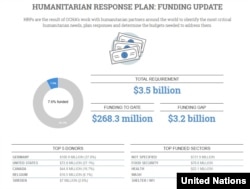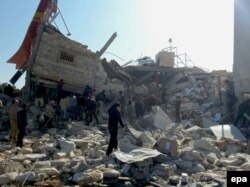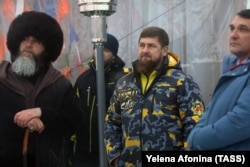The Chechen government TV report’s reference to Russian troops “on the front line” contradicts the Kremlin’s long-standing claim that Russia has no ground troops in Syria. Polygraph.info has investigated and debunked that claim, with evidence that the Russian private military company Wagner was involved in a military attack.
The Chechen TV report also repeated claims made in social media by the head of Chechnya, Ramzan Kadyrov, that his Kadyrov Foundation is superior to any other international humanitarian organization in delivering aid to Syria.
Any help to people in need is significant, and Polygraph.info does not dispute the value of such actions. However, Kadyrov’s claims are inaccurate and contrary to the facts, in terms of the time period his foundation has been operating in Syria, and the consistency and amount of aid it has been providing.
Ziyad Sabsabi, Ramzan Kadyrov’s envoy to the Middle East and North Africa, announced the start of the Chechen humanitarian campaign in Syria earlier this year - on January 29.
This means the Kadyrov Foundation has been in Syria for just three months, compared to the seven years that many other humanitarian groups have been on the ground in Syria, where the internal conflict began in 2011.
In a post on the social media platform Mylistory on March 28, Kadyrov said his foundation “is continuing an unprecedented humanitarian action” in Syria – providing, “jointly” with Russian troops, groceries and water to 700 refugees on the front-line in Eastern Ghouta.
Compare that to the estimated 7.6 million people across Syria the United Nations and its partners have reached with humanitarian assistance each month.
In an earlier Mylistory post on March 22, Kadyrov claimed his foundation “remains the only organization uninterruptedly delivering food and clothes” to Syrian refugees.
According to the United Nations, more than 250 international humanitarian agencies and groups worldwide are jointly providing and delivering aid to Syria.
During 2016, over 4 million non-food items were distributed across Syria, while nutrition items were provided to some 3 million people and shelter was provided to nearly 300,000 people.
Since the U.N. began cross-border relief operations in July 2014, it has sent more than 467 cross-border convoys into Syria, an average of nearly four a week. This allowed U.N. partners to deliver medical supplies sufficient for 9 million treatments, including vaccinations for two million people.
In addition, the U.N. has carried out 294 airlifts to Qamishly, delivering 10,000 metric tons of food, including 120,000 full food rations; water, sanitation and hygiene; nutrition; education; shelter; and non-food items assistance on behalf of humanitarian actors.
Lastly, the Kadyrov Foundation appears to be limiting its aid exclusively to Syria’s Muslim population, while a majority of the other international organizations help people in need regardless of their religious, ethnic or racial identity.
“This is a long-term action, which will be completed before the start of the new school year,” Sabsabi said. “The most important stage will be on Muslim holidays: the holy month of Ramadan and the feast of sacrifice.”
Sabsabi said that by September of this year, the Kadyrov Foundation plans to distribute 500,000 packages of bread, and that it will feed 50,000 people daily during Ramadan – for which, he said, there are also plans to purchase 10,000 animals for sacrifice. The foundation, he said, will also finance surgical procedures for 100 Syrians in need of medical help.
Polygraph.info has fact-checked in the past several claims by Ramzan Kadyrov, all of them exaggerated, including: his military threat against the United States; his total victory over terrorism; that his Instagram clone, Mylistory is supposedly better than the original; that Chechens were a small drop in the sea of Islamic States foreign fighters, when there were thousands.


